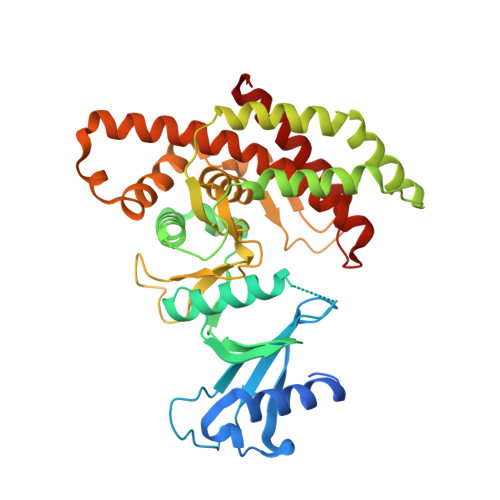Novel Small Molecule Inhibitors of Choline Kinase Identified by Fragment-Based Drug Discovery.
Zech, S.G., Kohlmann, A., Zhou, T., Li, F., Squillace, R.M., Parillon, L.E., Greenfield, M.T., Miller, D.P., Qi, J., Thomas, R.M., Wang, Y., Xu, Y., Miret, J.J., Shakespeare, W.C., Zhu, X., Dalgarno, D.C.(2016) J Med Chem 59: 671-686
- PubMed: 26700752
- DOI: https://doi.org/10.1021/acs.jmedchem.5b01552
- Primary Citation of Related Structures:
5EQE, 5EQP, 5EQY - PubMed Abstract:
Choline kinase α (ChoKα) is an enzyme involved in the synthesis of phospholipids and thereby plays key roles in regulation of cell proliferation, oncogenic transformation, and human carcinogenesis. Since several inhibitors of ChoKα display antiproliferative activity in both cellular and animal models, this novel oncogene has recently gained interest as a promising small molecule target for cancer therapy. Here we summarize our efforts to further validate ChoKα as an oncogenic target and explore the activity of novel small molecule inhibitors of ChoKα. Starting from weakly binding fragments, we describe a structure based lead discovery approach, which resulted in novel highly potent inhibitors of ChoKα. In cancer cell lines, our lead compounds exhibit a dose-dependent decrease of phosphocholine, inhibition of cell growth, and induction of apoptosis at low micromolar concentrations. The druglike lead series presented here is optimizable for improvements in cellular potency, drug target residence time, and pharmacokinetic parameters. These inhibitors may be utilized not only to further validate ChoKα as antioncogenic target but also as novel chemical matter that may lead to antitumor agents that specifically interfere with cancer cell metabolism.
- ARIAD Pharmaceuticals, Inc. , 26 Landsdowne Street, Cambridge, Massachusetts 02139, United States.
Organizational Affiliation:

















